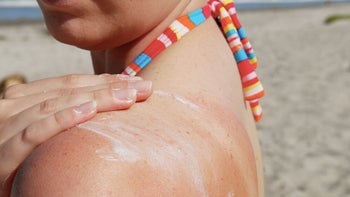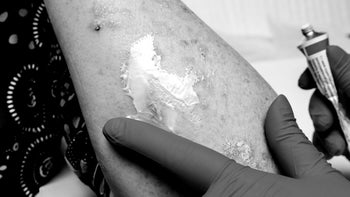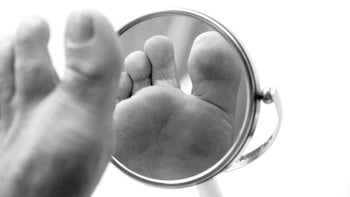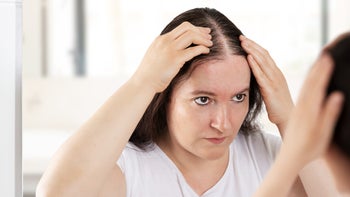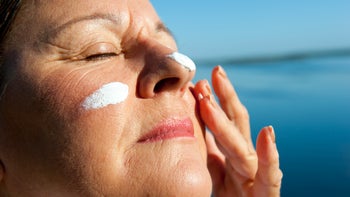
How Retinol Works to Benefit Your Skin in 5 Ways
Key takeaways:
Retinol is a topical form of vitamin A that’s used in many over-the-counter skin care products.
Retinol helps skin make new cells, makes skin look smoother, and fights acne.
In some people, retinol can cause skin irritation, like redness and flaking. To avoid these effects, start slowly and build up gradually over time. Apply at night, use moisturizer, and wear sunscreen during the day to protect sensitive skin.

When it comes to popular skin-care ingredients, there’s nothing quite like retinol. Many over-the-counter (OTC) products include this superhero ingredient. People swear by its many benefits — and for good reason. Retinol has many proven skin benefits. Just remember to use it responsibly since it can be powerful and cause irritation.
What is retinol?
Retinol is a topical form of vitamin A. It’s an active ingredient in many OTC skin creams, serums, and lotions. Retinol is related to retinoids, which are prescription-strength topical forms of vitamin A that have been used in dermatology for decades.
Retinol has many of the same benefits as retinoids (more on this below). But it’s available OTC because it’s not as strong.
One Prescription + One Pump + Once a Day
Introducing CABTREO: the treatment that has clindamycin phosphate, adapalene, and benzoyl peroxide all in one topical application. Now cash pay patients pay no more than $100 using GoodRx.

How does retinol work?
When you use retinol (or a topical retinoid), it diffuses into your skin and turns into its active form called retinoic acid. Retinoic acid acts on the skin cells and changes how they behave. This has a wide range of helpful effects on the skin.
Retinol is an exfoliant. That means it promotes skin-cell turnover. Skin is always making new cells to replace the old ones that get damaged or die. But this process can slow down as you get older, so the skin doesn't make new cells as quickly. Retinol helps speed up how often your skin makes new cells. This helps your skin look brighter and younger.
Retinol also stimulates the production of collagen and elastin. These are proteins that give skin its strength and elasticity. By increasing the production of collagen and elastin and slowing their breakdown, retinol can help make your skin look smoother and lessen the look of wrinkles or fine lines.
Retinol can also help keep pores unclogged — improving acne (more on this below).
Who should use retinol?
Almost everyone can benefit from retinol. According to Dr. Abigail Waldman, a dermatologist and assistant professor at Harvard Medical School, retinol is for anyone who isn’t pregnant or trying to become pregnant and wants to “improve the appearance of their skin, prevent aging, and fade hyperpigmentation.”
For teenagers and young adults who struggle with acne, retinol and other retinoids can be a great treatment to keep breakouts at bay. As you move into adulthood, retinol helps prevent — and treat — the many signs of skin aging.
Read more like this
Explore these related articles, suggested for readers like you.
Top 5 benefits of using retinol
Let’s take a closer look at the many proven benefits of using retinol and why you should consider adding it to your regular skin-care routine.
1. Keeps pimples at bay
Retinol and other retinoids are the cornerstone of acne treatment. Dr. Waldman explains, “While retinol has less effect on acne, other retinoids such as adapalene and tretinoin can also be used for that purpose.”
Retinol and retinoids can unclog your pores and prevent them from getting blocked with oil and dead skin cells. This is important because blocked pores can lead to pimples and breakouts.
By keeping your pores clear, they can help lessen acne and make your skin look clearer. They also help regulate oil production, targeting another cause of acne. So it’s no surprise that retinol and retinoids are among the best ways to treat and prevent acne.
2. Helps reverse sun damage
Over time, sun exposure can take a toll on skin. This increases your risk of skin cancer. And it causes photodamage, leading to uneven skin tone, wrinkles, and loss of skin elasticity (so wrinkles and creases start to form).
Retinol helps reverse many of the signs of photodamage. Dr. Waldman notes that it “helps skin turnover and increases collagen production, resulting in fewer wrinkles, smoother skin texture, and faded brown spots.” All of these changes lead to brighter and firmer skin as well as a more youthful complexion.
3. Treats wrinkles and improves skin texture
One major benefit of using retinol is younger-looking skin, no matter how old you are. With age, skin starts losing collagen and elastin, those proteins that help keep skin supple, plump, and smooth.
Since retinol affects collagen and elastin, it can minimize the look of wrinkles and improve skin texture. It also promotes skin exfoliation, leaving skin looking brighter and feeling smoother.
4. Evens out skin tone and treats pigmentation
Skin hyperpigmentation, like acne scars, sun spots, and melasma, can be frustrating to deal with. Retinol can help with this, too.
It does this by blocking excess pigment (melanin) from forming. And since it acts like an exfoliant, retinol also leads to a brighter, more even skin tone.
5. Acts gently on skin
Retinol isn’t as strong as other retinoids, which means it isn’t as harsh, either. Because of this, many people can use retinol without many of the side effects that are commonplace with topical retinoids, like skin redness and dryness. So retinol has many of the benefits of stronger retinoids, but without the drawbacks.
Choosing between different retinol formulations
In general, the higher the concentration of retinol, the more benefits you’ll notice. There are many different retinol formulations available, like creams, serums, and gels. And these different formulations can affect your skin differenFor example, according to Dr. Waldman, “Serums are more potent than creams but can also be more irritating for the same reason.” With higher strengths, you may get faster results, but you may also be more likely to have irritation.
This is why Dr. Waldman recommends, no matter which formulation you choose, “The best formulation and strength is going to be the one you can use long term.”
When choosing a retinol cream, look for these ingredients:
Retinol
Retinyl esters
Retinyl propionate
Retinaldehyde
Retinyl palmitate
Retinyl retinoate
OTC products have retinol doses up to 2%. So choose the highest one that your skin can tolerate and that fits your budget. For the strongest OTC product available, try Differin (adapalene 0.1% gel), a prescription-strength retinoid that no longer needs a prescription.
How to use retinol
Dr. Waldman explains that it’s best to use retinol at night because the sun can deactivate it. If you have sensitive skin, or you’re new to using retinol, start once every 2 or 3 days to avoid irritation. Then you can work your way up to using it nightly if that works for you and your skin type.
After applying retinol, Dr. Waldman recommends applying an OTC moisturizer to help with irritation. And keep in mind it will take 8 to 12 weeks to start noticing retinol’s benefits. So be patient, and stick with it.
Does retinol have negative effects?
Retinol can have powerful effects, so you need to use it carefully.
With careful use, most people don’t experience any negative effects from retinol. But some people may get some skin irritation, like redness, burning, or dryness.
If this is the case for you, try using retinol less often, or go with a lower strength. Over time, skin builds a tolerance to retinol, and most people can use it regularly without any problems.
Who shouldn’t use retinol?
In general, experts don’t recommend retinoid use during pregnancy. Retinol isn’t as strong as retinoids. Even so, if you’re pregnant, talk with your obstetrician before starting or continuing retinol.
The bottom line
Retinol is a popular skin-care ingredient that’s used in many over-the-counter products, like creams, lotions, and serums. And for good reason. It has many proven skin benefits, like treating acne, reducing fine lines and wrinkles, and improving the look and texture of skin.
Most people tolerate this powerful ingredient very well. If you experience any skin irritation, like redness and flaking, cut back on how much you use. Then you can increase it gradually over time. Retinol is best used at night. But, to enhance its effects, don’t forget sunscreen in the morning.
Why trust our experts?


References
American Academy of Dermatology Association. (2021). How to prevent premature skin aging.
Motamedi, M., et al. (2022). A clinician’s guide to topical retinoids. Journal of Cutaneous Medicine and Surgery.
Spierings, N. M. K. (2021). Evidence for the efficacy of over-the-counter vitamin a cosmetic products in the improvement of facial skin aging: A systematic review. The Journal of Clinical and Aesthetic Dermatology.






